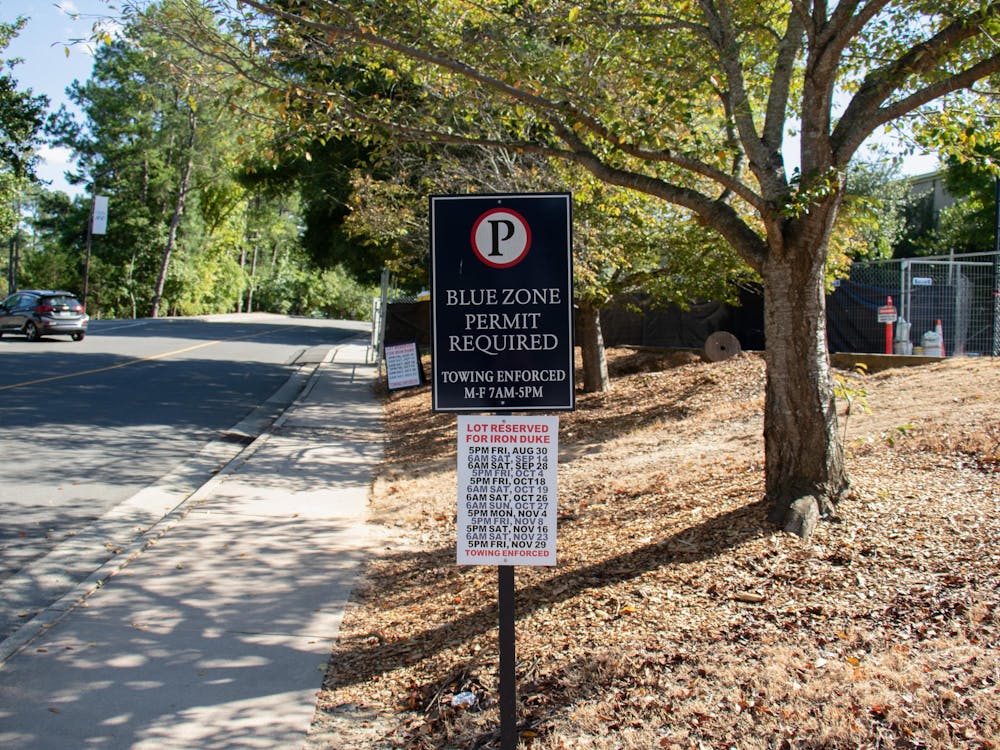With many Duke undergraduates bringing cars to campus, students reflected on the accessibility of the University’s parking facilities.
Students expressed how bringing a car grants them greater personal freedom through the ability to leave campus. But while many are content with their decision, some commented on various inconveniences related to the usage of vehicles on campus.
Students pay $474 annually for standard parking access, with facilities located at Smith Warehouse for students on East Campus, Blue Zone for students residing on West and a garage and parking lot to accommodate students living in apartments at 300 and 301 Swift.
While the Smith Warehouse is only a five-minute walk from East Campus, first-year students commented on parking spaces on the campus itself that frequently go unused.
“My only complaint is that I've noticed spots that are open behind my dorm all the time, so I wonder why I can't park my car there,” said first-year Ava Betanco-Born.
Betanco-Born, who hails from North Carolina, decided to bring her car to campus for the ease of driving home and the freedom that it offered her.
“I don't have to rely on the bus, whether that's Duke buses … or just other types of buses,” she said. “I feel like it's been really helpful having my car because I can go to Target or Whole Foods and not have to worry about walking potentially with a bunch of bags.”
Students living on West Campus park their cars in the Blue Zone, which encompasses eight individual parking lots adjacent to Wallace Wade Stadium. Because of its close proximity to the athletic facilities, permit holders are frequently advised to move their vehicles in advance of game days.
This year, the University is providing different parking passes for students based on their class year. However, some students have already experienced difficulties using their pass.
“I was accidentally assigned a Class of 2026 pass, so I tried to get in [the parking facility], and it was like: permit expired,” Rose said. “I just bought it two weeks ago, what do you mean, ‘permit expired?’”
Rose decided to bring her car in the middle of her first year, after realizing she needed to travel off campus more than she initially expected.
“A lot of people talk about the Duke bubble, and I was really experiencing it my freshman year up until the point where I was able to bring my car and really gain experiences outside of on-campus activities,” Rose said.
Some students without vehicles have managed to work around their lack of transportation by relying on friends.
“I've definitely depended on my friends who do have cars,” said senior Bess Pierre.
Pierre has not had a car for any of her time at Duke. She observed that during her first year, many car-owning students were North Carolina residents, but over time more of her friends have brought cars to campus.
“[It’s] sometimes logistically challenging if you want to go out to dinner or go get groceries once you live on West,” she said. “It can be a struggle to figure that out.”
Because they make up a minority of the Duke undergraduate population, students with cars are often faced with navigating requests for rides from their peers.
“I wouldn't say people have taken advantage of me, but I am pretty reserved in telling people where I'm going,” Rose said. “People are usually pretty good, though, about asking for [rides].”
Nevertheless, many students noted that a car is not an essential amenity to life at Duke.
“Campus is pretty nuclear in the sense that it's not the end of the world if you don't have one,” she said.
Get The Chronicle straight to your inbox
Sign up for our weekly newsletter. Cancel at any time.
Sarah Diaz is a Trinity first-year and a staff reporter for the news department.

